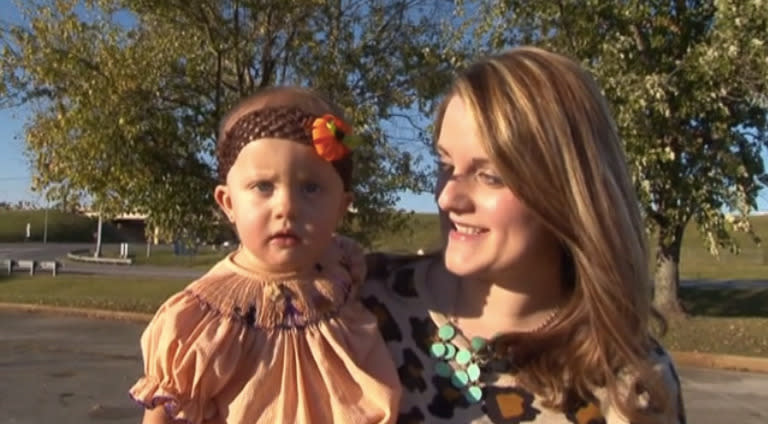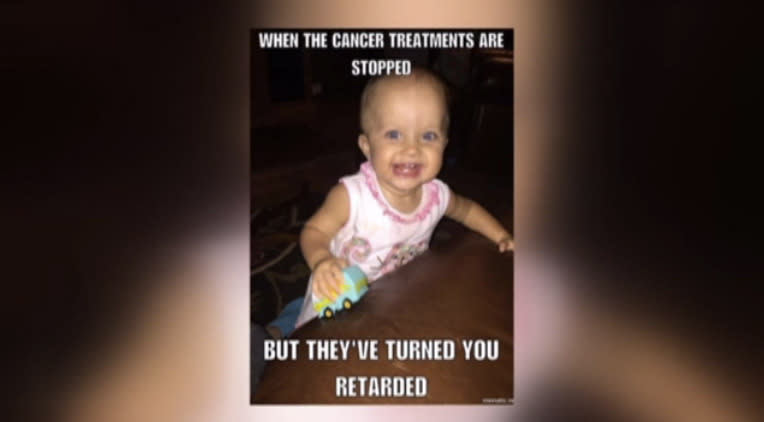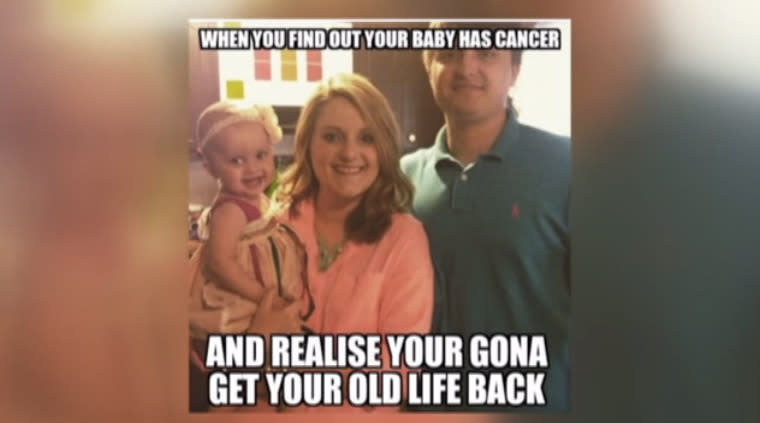Offensive Photos of 16-Month-Old on Facebook Spur Mom Into Action

The mother of a 16-month-old girl whose photos were stolen and turned into Internet memes is speaking out in hopes of helping other parents.
STORY: What to Consider When Sharing Your Kids Online
Ashton Hamner is mother to Lennox (above), a healthy toddler and, like plenty of parents, sometimes shares pictures of her daughter online. But recently, the Alabama mom was alerted that her daughter’s image was being used for offensive memes, making jokes about having cancer and being “retarded.”

A meme created from photos of Lennox, Ashton Hamner’s 16-month-old daughter. (Photo: WAFF)
Hamner found the images after a Facebook friend tagged her in a comment about one of the memes. “[The pictures] were making fun of [my daughter] for being bald, and saying she had cancer and that I should kill her, and that she was retarded, and really hateful things,” Hamner told WAFF. “I cried. That’s all I could do. I was very upset about it. I just couldn’t believe what I was seeing.“
STORY: 5 Reasons You Don’t Need to Worry About Kids and Social Media
The memes said things like, “When you find out your baby has cancer, and realise your gona get your old life back” and, “When the cancer treatments are stopped, but they’ve turned you retarded.”

Ashton Hamner discovered this offensive meme, created from a photo she posted of her family online. (Photo: WAFF)
Hamner, who didn’t respond to Yahoo Parenting’s request for comment, reported the images to Facebook, and the social media site took them down. Still, once images like these are online, deleting them from the Internet entirely is a near impossible task, says Caroline Knorr, parenting editor at Common Sense Media, a nonprofit dedicated to promoting safe technology for children.
“If you put a picture of anything online, you need to be aware that it can be used in ways you never intended it to be used for,” Knorr tells Yahoo Parenting. “Even if you used all your privacy settings, even if you limit your audience to friends and family, anything you put online can be copy and pasted. It’s as simple as a right-click, so it’s a risk.”
That’s exactly what happened to Brooklyn mom Julia Fierro, when a picture of her then-2-year-old daughter was stolen off her husband’s Facebook page in 2011 and turned into a meme. The photo shows her daughter in a swing, making her best angry face, and it was intended as a joke. When both Fierro and her husband posted the picture online, one of her husband’s colleagues slapped the words “Mood Swing” on the image and posted it to Reddit, in hopes of getting what the website calls “karma points.” After Fierro’s husband inquired on Facebook about who stole the photo, the colleague apologized and contacted Reddit to take the image down. But by then, the image had taken on a life of its own.
“It felt harmless, but it just kept popping up and people were seeing it in different places, and we just thought it was so weird,” Fierro, author of the novel Cutting Teeth, tells Yahoo Parenting. “We didn’t even know what a meme was at the time. But she is going to be on the first page of Google Images for ‘mood swing’ forever. And it still recycles itself. I’ll see it pop up on someone’s Instagram or something every now and then.”

This photo of Julia Fierro’s daughter was turned into a meme that went viral after she and her husband both shared the image on Facebook. (Photo: Reddit)
The incident didn’t stop Fierro from sharing photos online, but she says she sometimes thinks twice before posting. “My general stance is, anything any parent puts online is public. That’s something every parent should know. Even if you only post one picture of your child on Facebook ever, you have opened that gate,” she says. “So if we put something online and it goes viral or is stolen, it’s hard to say, ‘Oh my gosh, I can’t believe that happened.’”
That’s not to say people shouldn’t take advantage of the privacy settings that sites like Facebook and Instagram offer, to protect themselves as much as possible. “You should absolutely use the settings to limit your audience,” Knorr says. “On Instagram, set your account to private. On Facebook, limit who can see your images to family and friends. If you post pictures of your kids and other people are in the pictures, don’t tag them, because that links it to another profile that other people can see.”
But even if parents use all their best efforts to keep their pictures safe, Internet trolls are an unfortunate reality, Knorr says. “It starts with the person who posted the photo. I don’t mean to blame the victim and it’s not an epidemic, but there is a risk,” Knorr says. “That’s the world we’re living in. Everyone is thinking ‘It’s my kid, she’s adorable, everyone will love this picture.’ But you have to remember that not everybody shares that perspective.”
Knorr isn’t against sharing photos online, she just thinks Internet users need to be aware of what can happen. “Sharing online is the world we live in,” she says. “It is important to just pause and think and use the tools that social media allows us to use to minimize our risk.”
After her experience, Hamner has done just that. "I went back and changed all my settings, and now no one can access my photos unless they’re on my friends group,” Hamner told WAFF. “Just be really careful about what you share.”
(Top photo: WAFF)
Please follow @YahooParenting on Facebook, Twitter, Instagram, and Pinterest. Have an interesting story to share about your family? Email us at YParenting (at) Yahoo.com.

